Spice It Up: 10 Essential Spices for Health & Culinary Magic!
Spices are more than just kitchen staples; they’re little packets of magic waiting to show off their powers on both our meals and our well-being.
Have you given them credit before or even used them for health as well as spice?
If not, you’re in for a treat.
#10 Turmeric: the “Golden Spice”

Known as the golden spice, turmeric is your go-to for knocking out inflammation and giving your brain function a boost, all thanks to curcumin. It’s like the top of spices, fighting off the baddies in your body with its antioxidant powers.
What does it do? Turmeric steps into the ring against inflammation and oxidative stress, backing up your joint health, brain power, and overall wellness. It’s the spice equivalent of having a personal wellness coach.
How can I use it? Whip turmeric into your daily routine by throwing a teaspoon into your morning smoothie, jazzing up your rice dishes with a golden glow, or winding down with a comforting cup of turmeric tea. It’s like a health hack hidden in plain sight.
#9 Cinnamon: not just for lattes!

This sweet yet spicy powerhouse is not just for your lattes; it’s a health-boosting marvel, loaded with antioxidants and known for its blood sugar regulation abilities.
What does it do? Cinnamon is like your body’s best friend, working to keep your heart healthy and your blood sugar levels in check. Its compounds have potent anti-inflammatory properties, helping to fight off diseases and reduce the risk of heart disease.
How can I use it? Sprinkle cinnamon over your morning oatmeal, blend it into smoothies, or stir it into your coffee for a sweet, spicy kick. It’s a simple way to spice up your day with a touch of wellness.
#8 Ginger: soothes nausea

Ginger, with its zesty kick, isn’t just a flavour enhancer; it’s a stomach’s best ally, famous for soothing nausea and aiding digestion.
What does it do? Ginger calms upset stomachs, eases digestion, and is a go-to natural remedy for nausea. Beyond the gut, it’s known for its anti-inflammatory and antioxidant effects, offering relief from soreness and boosting overall health.
How can I use it? Incorporate ginger into your diet by grating it into stir-fries, blending it into a morning juice, or steeping it for a warming tea. It’s an easy way to add a spicy health kick to your meals and snacks.
#7 Cayenne pepper: weight loss
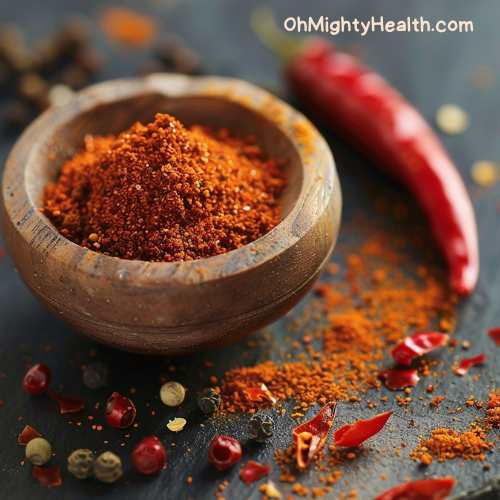
Cayenne pepper is not just about bringing the heat to your dishes; it’s a metabolic booster that can kick your body’s energy-burning furnace into high gear.
What does it do? This fiery spice heats up your metabolism, aiding in weight loss, and packs a punch with its pain-relieving properties. It’s also loaded with vitamins and antioxidants that support immune function and promote heart health.
How can I use it? Sprinkle cayenne pepper into your soups, stews, or on roasted vegetables for an extra layer of flavour and a metabolism boost. Just a pinch can turn the heat up on both your meals and your health.
#6 Black pepper: the “King of Spices”
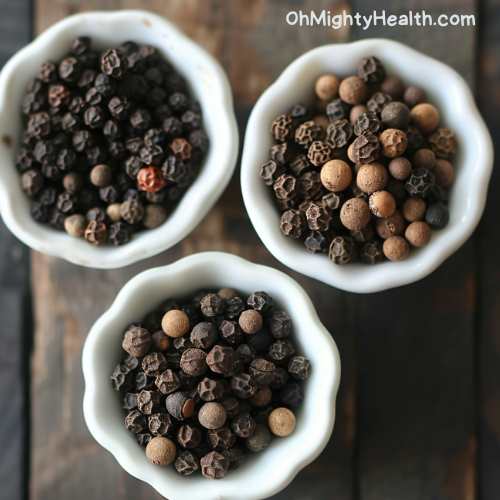
Black Pepper, often called the “king of spices,” is more than just a table staple; it enhances nutrient absorption and offers a subtle heat that complements any dish.
What does it do? Beyond its role in seasoning, black pepper boosts the absorption of vital nutrients like turmeric’s curcumin, contributing to improved digestion and overall gut health. Its piperine content also has notable antioxidant and anti-inflammatory properties.
How can I use it? Freshly grind black pepper over your meals, from salads to soups and everything in between. It’s a simple twist that can significantly enhance both the flavour and health benefits of your food.
#5 Cloves: natural antiseptic
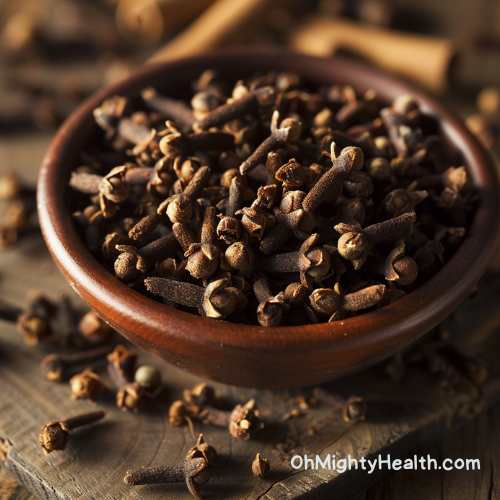
Cloves, the small but mighty spice, are renowned not just for their intense flavour but also for their medicinal properties, including natural antiseptic and anti-inflammatory effects.
What does it do? Packed with antioxidants, cloves offer a protective effect against oxidative stress and infections. They’re particularly celebrated for their ability to ease dental pain and improve oral health, thanks to their antimicrobial properties.
How can I use it? Integrate cloves into your diet by adding them to spice blends, infusing them into teas, or incorporating them into your baking for a warm, spicy note. Ground cloves can also add a depth of flavour to savoury dishes.
#4 Cardamom: digestive health
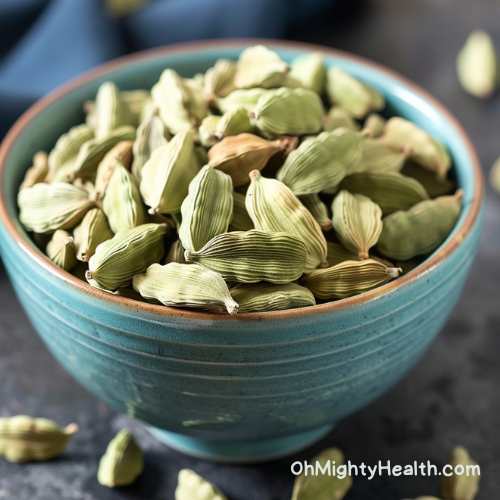
Cardamom, often referred to as the “queen of spices,” brings a sweet, aromatic flavour to dishes and drinks alike, alongside a wealth of digestive health benefits.
What does it do? This spice is a natural breath freshener and aids in digestion, helping to soothe upset stomachs. Its anti-inflammatory properties also contribute to improved blood circulation and heart health, making it a multitasking marvel in your spice arsenal.
How can I use it? Sprinkle ground cardamom on oatmeal or fruit, add pods to your coffee or tea for a unique twist, or use it in baking for a fragrant, sweet flavour. Cardamom’s versatility makes it an exquisite addition to both sweet and savoury dishes.
#3 Cumin: immune boosting
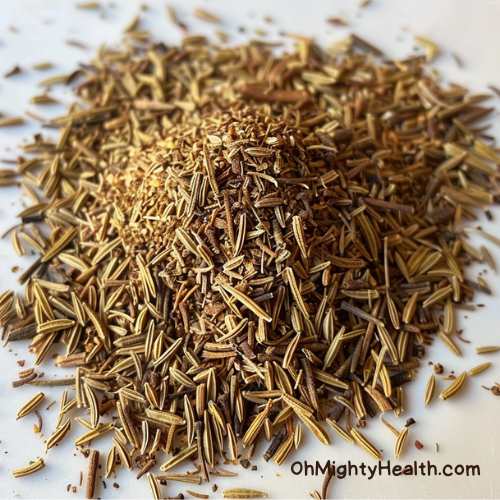
Cumin, with its earthy, warm flavour, is a staple in spice cabinets around the world, celebrated not only for its culinary versatility but also for its digestive aid and immune-boosting properties.
What does it do? This powerful spice is known to stimulate digestion, improve blood sugar control, and support weight loss. Its rich antioxidant content helps fight inflammation and boosts the immune system, making it a go-to spice for overall wellness.
How can I use it? Toast cumin seeds to release their flavour before adding them to curries, stews, and soups, or sprinkle ground cumin into vegetable dishes and marinades. Its distinct taste brings depth and warmth to any recipe.
#2 Coriander: blood sugar stabiliser
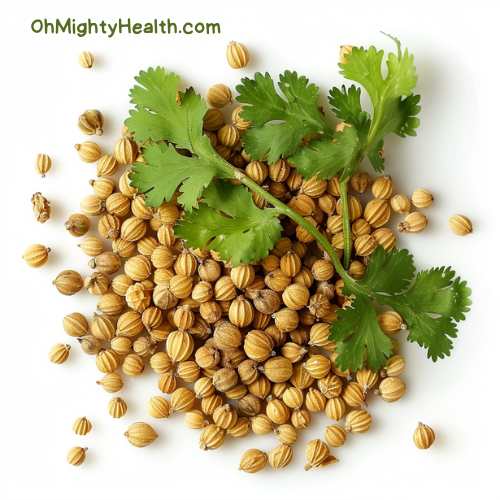
Coriander, with its lemony, floral notes, does more than add a fresh burst of flavour to recipes; it’s a digestive aid and a blood sugar stabiliser wrapped in one fragrant package.
What does it do? This versatile spice, derived from the seeds of the cilantro plant, is known for its ability to aid digestion and soothe stomach discomfort. Its antioxidant properties also help regulate blood sugar levels and support heart health.
How can I use it? Ground coriander can be used to season meals, sprinkled in vegetable dishes, or incorporated into spice rubs and marinades. Whole coriander seeds can be toasted and ground fresh or added to pickling brines for an extra flavour dimension.
#1 Fennel seeds: breath freshener

Fennel seeds, with their sweet, liquorice-like flavour, are more than just a key ingredient in Mediterranean cuisine; they’re a powerhouse for digestive health and a natural breath freshener.
What does it do? Renowned for their ability to relieve digestive issues such as bloating, gas, and cramps, fennel seeds are also packed with nutrients that promote heart health. Their anti-inflammatory properties can help calm the body and soothe soreness.
How can I use it? Chew on raw fennel seeds after meals to freshen breath and aid digestion, sprinkle them over salads for a crunchy, flavorful boost, or steep them in hot water to make a soothing tea. Fennel seeds can also be toasted and added to breads, curries, and soups for an aromatic twist.
Such simple hacks for healthier living
Turning into our spice racks isn’t just about jazzing up our dinners; it’s a small act of magic for our well-being.
Each spice, from the kick of cayenne to the comfort of cinnamon, is a little life hack for healthier living.
So, next time you’re seasoning, remember it’s not just flavour you’re adding, but a sprinkle of health, too.
Here’s to making every meal a secret potion for wellness – who knew our kitchens hid such treasures?

